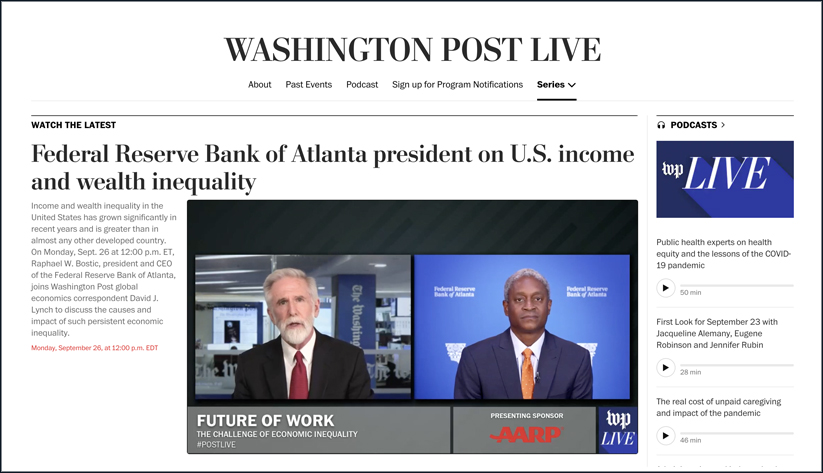
Economic inequality impairs the economy, so it is relevant as the Fed determines monetary policy, Bostic said during a September 26 conversation with David J. Lynch, global economics correspondent with the Washington Post. The talk is available as a free podcast.
Bostic said he identified economic inequality as an issue that bears on the economy at the outset of his term as Atlanta Fed president in June 2017. Bostic questioned the benchmark for maximum employment and concluded the economy was not hitting on all cylinders.
"There were parts of our economic community that were not contributing nearly as much as they might have otherwise, and that was constraining our economy potential," Bostic said, according to a transcript. "That was stopping or slowing our ability to get to maximum employment."
The inclusion of this issue in decision-making has informed the Fed's recent outlook on monetary policy, Bostic said. In recent years, the Fed determined to not slow the economy "until we actually saw inflation start to move, and then once that happened, we would slow it down." The decision helped millions of people get jobs in the period leading to the COVID-19 pandemic, Bostic said.
"There were parts of our economic community that were not contributing nearly as much as they might have otherwise, and that was constraining our economy potential. That was stopping or slowing our ability to get to maximum employment."
—Raphael Bostic, Atlanta Fed president and CEO
Now that inflation is evident, Bostic observed, "no one should doubt our resolve to get inflation under control." Two days later, Bostic said in a conference call from Atlanta that he foresees the central bank raising the interest rate by year's end to a level between 4.25 percent and 4.5 percent.
In response to a question, Bostic said the Fed's recognition of economic inequality is not an expansion of the Fed's congressionally mandated role. "I'm laser-focused on the dual mandate, and I don't want anyone to think that I spend any time on things that are not directly contributing to our mandate," Bostic said. "I don't have any interest or goal to get our institution to go beyond that."
The Federal Open Market Committee on January 25 reaffirmed its definition of maximum employment as a "broad-based and inclusive goal that is not directly measurable and changes over time." The Committee's policy decisions "must be informed by assessments of the shortfalls of employment from its maximum level, recognizing that such assessments are necessarily uncertain and subject to revision."
Lynch noted Bostic's early position on economic inequality by citing remarks from a speech Bostic delivered in 2021, An Economy That Works for All. Lynch recalled Bostic noting that, in Mississippi following World War II, the state-controlled, VA-guaranteed home loan program issued 3,200 home loans and only two went to Black borrowers.
In addition, Bostic previously had presented his thoughts on economic inequality in a 2020 essay published by the Atlanta Fed, A Moral and Economic Imperative to End Racism. Subsequent to the essay, Bostic and two other Fed presidents collaborated to initiate a 10-part series that started in 2020 and was hosted by all 12 District Banks, Racism and the Economy.
Lynch questioned the Fed's capacity to address the effect of legacy inequities of the type Bostic described in Mississippi. Lynch asked, "what can the Fed do about those sorts of historic inequities?" Bostic responded that Lynch's very question acknowledges the Fed's ability to raise awareness of the "constraints" that have fettered equitable economic advancements. These constraints include impediments to home ownership, which Bostic said is a "traditional pathway for wealth building for families throughout the history of this country."
Bostic continued, observing that "having the American public be aware of the realities that have prevented some from getting to these experiences, I think, can help us have a richer conversation about things we might do to try to make sure that doesn't happen moving forward."
Lynch turned the conversation to financial reparations for the descendants of enslaved people. Bostic responded the issue is one for lawmakers. However, Bostic identified two examples of civic-based efforts to affect racial equality in the workplace. The Metro Atlanta Chamber established in 2021 the ATL Action for Racial Equity. Georgia's lieutenant governor launched in 2020 the public/private Partnership for Inclusive Innovation (PIN). Bostic serves as 2022 chair of the Metro Atlanta Chamber and serves on PIN's advisory board.
Bostic said he's hopeful that economic inequality can be redressed, though he expects the process will take "many, many years." Bostic offered a long view on the reason for his outlook: "I'm also very optimistic about what we can do as Americans, and I think that the more that we see that there is potential and growth and good ideas coming from places that we haven't always looked at closely, I have every confidence that we will start to see more and more capital flow there and more and more investment in ways that allows us to get broader growth and more employment and a more resilient economy."




